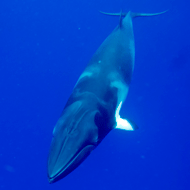
IWC meeting decision "a win for whales"
The International Whaling Commission (IWC) has voted to increase scrutiny of scientific whaling programmes.
The proposal was put forward by the Australian and New Zealand governments, during IWC's 66th meeting in Slovenia. There were 34 votes in favour, 17 against and 10 abstentions.
The resolution aims to improve the review process for scientific whaling programmes, such as those carried out in Japan.
Ingrid Giskes, global head of sea change for World Animal Protection, called the move "a win for whales".
However, the resolution is not legally binding for members of the commission.
Whale hunting for commercial gain was banned in 1986, but over 50,000 whales have been killed since then due to loopholes that allow some countries to continue whaling, such as Norway and Iceland. IWC also allows aboriginal subsistence whaling in some countries.
Japan uses a loophole that allows whale hunting for research purposes. But the international court ruled in 2014 that the country's last whaling programme in Antarctica was illegal and ordered it to cease. The decision followed a court case brought by the governments of Australia and New Zealand. Despite initially complying with the ruling, Japan announced in December last year that it would be resuming a new whaling programme in Antarctica. It also carries out operations in the North Pacific.
Ingrid Giskes added: "The IWC has sent a clear message to Japan that whaling in the name of science can no longer be used to cover the hunting of whales for profit. [The] decision goes a long way to closing the loophole in the global ban on commercial whaling that Japan has continued to exploit.
"World Animal Protection warmly congratulates the governments of Australia and New Zealand and those that supported them. We commend their determination to protect whales in the Southern Ocean and around the world."



 The veterinary mental health charity Vetlife is inviting the veterinary community to join it for a sponsored cold-water dip.
The veterinary mental health charity Vetlife is inviting the veterinary community to join it for a sponsored cold-water dip.